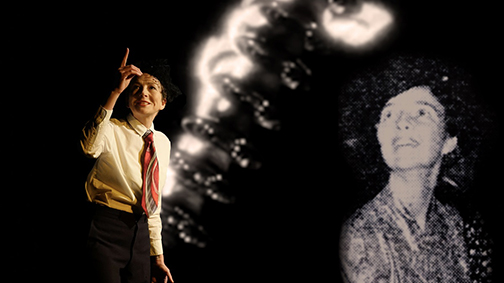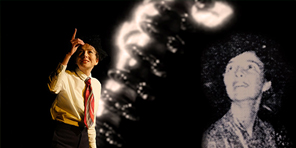by Pete Rosenbery
CARBONDALE, Ill. — Filmmaker and former Southern Illinois University Carbondale faculty member Sarah Kanouse will bring a combination of storytelling, lecture and live documentary film to campus later this month.

With an electrical corona discharge and a photograph from a ceremony marking the arrival of power from the Hoover Dam to Los Angeles in 1936, Sarah Kanouse, left, a one-time assistant cinema professor at SIU Carbondale, brings her solo performance, “My Electric Genealogy” to campus at 6:30 p.m. Feb. 15. (Photo by Cairo Marques-Nieto).
Kanouse will present her 75-minute solo performance “My Electric Genealogy” at 6:30 p.m. Feb. 15 in Parkinson Hall’s Browne Auditorium. A 15-minute Q&A will follow. The event is free and open to the public. A 4-minute excerpt of Kanouse’s performance is available on Vimeo.
The performance takes a look at issues surrounding climate change and the world’s ecological crisis and explores the cultures and politics of energy in Los Angeles through the lens of her own family. For nearly 40 years, Kanouse’s grandfather designed, planned and supervised the spider-vein network of lines connecting the nation’s second-largest city to distant power sources — rivers that are now drying up and power plants that are coming down.
Now an associate professor in the College of Arts, Media and Design at Northeastern University, Kanouse was an assistant professor in the now College of Arts and Media from 2005-2008. Kanouse made a few projects around Southern Illinois; in 2013, her feature-length essay film “Around Crab Orchard” premiered at the Big Muddy Film Festival, where it won the John Michaels Award.
Kanouse has visited several times and said she is excited to return.
“SIU has such a rich tradition of experimental arts and culture, stretching back to the time that Buckminster Fuller was on faculty and Allan Kaprow led Happenings around the Campus Lake,” she said. “Southern Illinois is also a beautiful and fascinating place.”
Project evolved for several years
“My Electric Genealogy” premiered in September 2022 in Los Angeles at 2220 Arts and Archives. Kanouse said her daughter’s birth, along with query in 2012 while Kanouse was in residency at the Headlands Center for the Arts near San Francisco on why she hadn’t made a project specifically about climate change, helped guide her. The “germ of the idea to use performance” to discuss her family’s entanglements in the climate crisis came in 2014, when Kanouse, then at the University of Iowa, contributed a 5-minute monologue to a “10 Tiny Performances” event by choreographer Esther Baker-Tarpaga.
While Kanouse had never done that type of performance before, she “pursued the project as if I were making a film.”
“After sharing clips and speaking several times during works-in-progress presentations at artist talks and at residencies, I realized that my physical presence was an important part of the project,” Kanouse said, adding she spent time developing movement and performance skills.
Project was set to premiere in 2020
Kanouse explained that the program was to premiere nearly three years ago but was delayed by the COVID-19 pandemic and lockdowns. That, however, gave her time to “develop a relationship with some of the environmental justice groups advocating for reparative relationships over the same transmission lines that my grandfather built.”
“To say it’s been a long journey would be an understatement, but the project took the time that it needed to take,” she said.
She hopes her performance prompts the audience to become more engaged in addressing the climate crisis.
“The performance is a long meditation on complicity in forms of structural violence – racism, settler colonialism, patriarchy, presentism – that come together in the climate crisis,” she said. “Rather than being something to feel guilty about, complicity can be the basis of obligation and a directive to act – a concrete ‘response-ability.’ I am complicit in very specific and direct ways, but I hope working through this publicly will prompt the audience to consider their own inevitable complicity as the starting point for a more engaged and intimate obligation to address the ecological crisis.”
The performance is presented by SIU’s School of Media Arts, the College of Liberal Arts, the University Honors Program, the Fine Arts Activity Fee and the Mississippi River Project.

